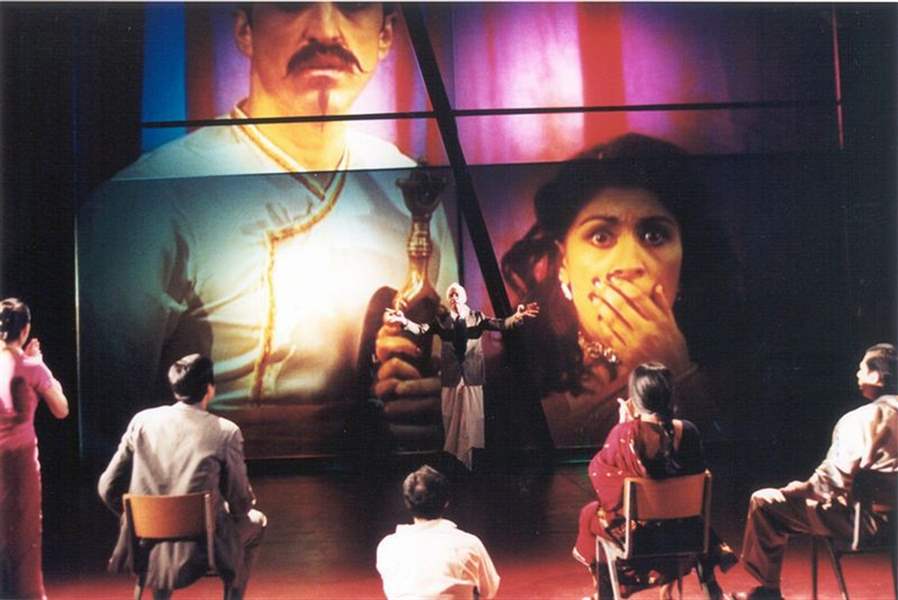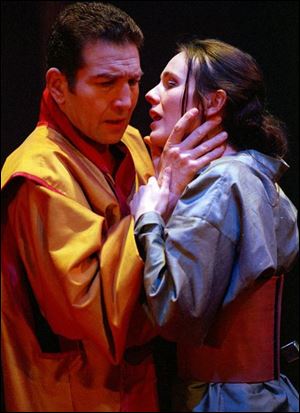
Shakespeare, Rushdie share Ann Arbor stage
3/2/2003
A scene from Salman Rushdie's new drama, <i>Midnight's Children.</i>
HO

A scene from Salman Rushdie's new drama, <i>Midnight's Children.</i>
The Royal Shakespeare Company is back in Ann Arbor for the second of three visits scheduled between 2001 and 2005. And while the British troupe will mount two Shakespearean oeuvres refashioned in fresh context, it is the American premiere of an epic piece by Salman Rushdie that is generating the most buzz.
Midnight's Children is a phantasmagorical tale of 20th-century India, seen here not through the eyes of the Hindu majority, but a Muslim family and their cucumber-nosed son, Saleem. It opens March 12.
Commissioned by the University Musical Society, a century-old nonprofit foundation affiliated with the University of Michigan, it has Shakespearean breadth.
“Like a work by Shakespeare, it has amazing language,” said Simon Reade, one of its adaptors, in a telephone interview from England.
“It has word play. It has poetry. It has language of the streets. It has heightened prose. But it also has history as a backdrop. And it's told through very, very personal and very, very psychologically insightful people.”
Spanning most of the 20th century, the story's spinner is Saleem, born at the stroke of midnight on Aug. 15, 1947, when India gained its independence and was split from Pakistan. In that midnight hour, 1,000 other children are born in India, all with magical powers, but none so great as Saleem, sired by a poor Hindu woman, and his counterpart, Shiva, born to wealthy Muslims. (Rushdie himself was born just weeks before India's independence.)
In a quiet act of revolution, a nurse switches the infants, sending Saleem home with the Muslim family who celebrate with fireworks and receive congratulations from Prime Minister Nehru. Shiva, in turn, becomes a street tough.
Saleem's life entwines magically with the two nations. He leads the action through three generations of his Kashmiri family set against India's history from 1915 and 1978. Eventually, his parents learn Saleem is not their biological creation, and he encounters the womanizing, marauding Shiva.
“It's very outspoken about the relationships between different peoples,” said Reade.
The 20-member cast, mostly British-Asian, portray more than 70 characters on a mostly bare stage. Video footage of newsreel events as well as abstract images play on a huge screen alongside the stage action.
Fast-paced and richly drawn, it's packed - like India itself - with an almost overwhelming range of people, subplots, and issues. After three-and-a-half hours of Bollywood-flavored gods and humans, psychic powers, love and sex, politics and betrayal, song and dance, one British critic moaned: “Too much plot and too little story.”
Others snarled that it was too cluttered and too obvious. Its multitude of characters was confusing. And it painted a tourist-brochure view of India, leaving out the poverty and squalor. They raved, however, about the acting and Zubin Varla's performance as Saleem.
And its initial five-week run at London's Barbican Theatre, which ended last week, enjoyed enthusiastic crowds, said Reade, brushing aside the criticism.
“It's the nature of a new play. People are going to look at it more critically than they would a classic,” he said.
Ken Fischer, president of the University Musical Society, said he expects the piece will mature. “I'm remembering what critics said about Twyla Tharp's Movin' Out.” Choreographer Tharp continued tweaking it and it became a Broadway hit, he said. “If we relied on what critics said to form our opinions about everything, it would be a tragic situation.”
The UMS produces about 90 theater, music, and dance performances a year in Ann Arbor, Ypsilanti, and Detroit. Its partnership with the RSC has infused it with new life. In 2001, the society staged the Henry VI plays and Richard III at a cost approaching $3 million. With 17,000 tickets sold, it was a resounding success.

The Royal Shakespeare Company also is presenting <i>Coriolanus.</I>
Investment this year is about $3 million, said Fischer. The RSC's 2005 program has not been determined, he said, adding that the society expects to create partnerships with other theaters in the future.
“It is an amazing philanthropic gesture,” said Reade, 36, who was the dramaturge (literary manager) of the RSC when the Rushdie play was conceived. He is now co-director of the 18th-century Bristol Old Vic Theatre.
Eighteen months in the making, Midnight's Children aims to capture the spirit of Rushdie's vast 1980 novel of the same name, which won Britain's prestigious Booker Prize. Based on his novel, Rushdie wrote a five-and-a-half–hour television screenplay, which was never produced.
“It felt right to put a great Shakespearean-like work on,” said Reade. The UMS agreed to finance the project.
Reade and director Tim Supple, who had worked with Rushdie, carved a first-draft script from the screenplay. Rushdie joined them in dramatizing the piece, with much of the communications done via e-mails and later, in rehearsals.
“The main challenge was recognizing that we were writing a play as opposed to editing people's favorite bits from the book,” said Reade. “And in condensing and compressing and focusing it, we didn't want to make it a pygmy version of the novel. It needed to have the story-telling sweep and arc of the novel.”
Complementing the productions are lectures, discussions, and films, sponsored by the UMS, the UM's Center for South Asian Studies, and other groups.
Rushdie, who was born in 1947, will appear at two free public interviews at Rackham Auditorium on UM's main campus at 7 p.m. on March 11 and at 11 a.m. on March 12.
Following its Michigan performances, Midnight's Children moves to the Apollo Theater in Harlem, at the invitation of Columbia University, headed by Lee Bollinger, who was UM president when the RSC partnership was established. Returning to Great Britain, it will make an eight-city tour of England and Scotland.
This year's Shakespeare works are the warm-hearted comedy, The Merry Wives of Windsor, set in the aftermath of World War II. It which runs through March 9. Playing the rotund Falstaff, who connives to swindle two clever women, is Richard Cordery, who portrayed the Duke of Gloucester in the RSC's 2001 Ann Arbor productions of the Henry VI trilogy.
The political thriller Coriolanus, in which Shakespeare's hero is a valiant but arrogant Roman warrior, is given a Japanese Samurai treatment, including martial arts fighting scenes. Rarely performed, it opens today and continues through March 8 with the acclaimed Greg Hicks in the title role.
Both were staged at the Swan Theatre in Stratford-upon-Avon from October through January and share one ensemble company.